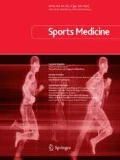References
Fry RW, Morton AR, Keast D. Overtraining in athletes: an update. J Sports Med 1991; 12: 32–65
Kuipers H, Keizer HA. Overtraining in elite athletes. J Sports Med 1988; 6: 79–92
Lehmann M, Foster C, Keul J. Overtraining in endurance athletes: a brief review. Med Sci Sports Exer 1993; 25: 854–62
Mackinnon LT, Hooper S. Mucosal (secretory) immune system responses to exercise of varying intensity and during overtraining. Int J Sports Med 1994; 15: S179–84
Morgan WP, Brown DR, Raglin JS, et al. Psychological monitoring of overtraining and staleness. Br J Sports Med 1987; 21: 107–14
Wishnitzer R, Berrebi A, Hurwitz N, et al. Decreased cellularity and hemosiderin of the bone marrow in healthy and overtrained competitive distance runners. Physician Sportsmed 1986; 14: 86–95
Barron JL, Noakes TD, Levy W, et al. Hypothalamic dysfunction in overtrained athletes. J Clin Endocrinol Metab 1985; 60: 803–6
Stone MH, Keith RE, Kearney JT, et al. Overtraining: a review of the signs, symptoms and possible causes. J Appl Sports Sci Res 1991; 25: 35–50
Hooper SL, Mackinnon, LT, Howard A, et al. Markers for monitoring overtraining and recovery. Med Sci Sports Exerc 1995; 27: 106–12
Budgett R, Koutedakis R, Walker M, et al. Overtraining syndrome/staleness. Proceedings of IOC Conference: 1989; Colorado Springs, USA, 118–9
Hooper SL, Mackinnon LT, Gordon RD et al. Hormonal responses of elite swimmers to overtraining. Med Sci Sports Exer 1993; 25: 741–7
Costill DL. Inside Running. Indianapolis: Benchmark Press, 1986: 123–34
Fry RW, Grove JR, Morton AR, et al. Psychological and immunological correlates of acute overtraining. Br J Sports Med 1994; 28: 241–6
Hackney A, Pearman SN, Nowacki JM. Physiological profiles of overtrained and stale athletes: a review. Appl Sports Psych 1990; 2: 21–33
Fry RW, Kraemer WJ, Lynch JM, et al. Does short-term near-maximal intensity machine resistance training induce overtraining? J Strength Cond Res 1994; 8: 188–91
Warren BJ, Stone MH, Kearney JT, et al. Performance measures, blood lactate and plasma ammonia as indicators of overwork in elite junior weightlifters. Int J Sports Med 1992; 13: 372–6
Flynn MG, Pizza FX, Boone JB, et al. Indices of training stress during competitive running and swimming seasons. Int J Sports Med 1994; 15: 21–6
O’Connor PJ, Morgan WP, Raglin JS, et al. Mood state and salivary Cortisol levels following overtraining in female swimmers. Psychoneuroendocrinology 1989; 14: 303–10
Verma SK, Mahindroo SR, Kansal DK. Effect of four weeks of hard physical training on certain physiological and morphological parameters of basket-ball players. J Sports Med 1978; 18: 379–84
Raglin JS, Morgan WP. Development of a scale for use in monitoring training induced distress in athletes. Int J Sports Med 1994; 15: 84–8
Carlile C, Carlile U. New directions in scientific training. Sydney: Carlile and Carlile, 1978
Kirwan JP, Costill DL, Flynn MG, et al. Physiological responses to successive days of intense training in competitive swimmers. Med Sci Sports Exerc 1988; 20: 255–9
Lehmann M, Dickhuth HH, Gendrisch G, et al. Training — overtraining: a prospective, experimental study with experienced middle- and long-distance runners. Int J Sports Med 1991; 12: 444–52
Brown RL, Frederick EC, Falsetti HL, et al. Overtraining of athletes: a round table. Physician Sportsmed 1983; 11: 93–110
Wolf WA. Contribution to the question of overtraining. In: Larson LA, editor. Health and fitness in the modem world. Chicago: Athletic Institute, 1961: 291–301
Dressendorfer RH, Wade CE, Scaff JH. Increased morning heart rate in runners: a valid sign of overtraining? Physician Sportsmed 1985; 13: 77–86
Rusko HK, Rahkila P, Vihko V, et al. Longitudinal changes in heart rate and blood pressure during overtraining period. Proceedings IOC Conference: 1989; Colorado Springs, USA: 45–6
Verde T, Thomas S, Shepard R. Potential markers of heavy training in highly trained distance runners. Br J Sports Med 1992; 26: 167–75
Morgan WP. Psychological components of effort sense. Med Sci Sports Exerc 1994; 26: 1071–7
Kindermann W. Overtraining — expression of a disturbed autonomic regulation. Dtsh Z Sportmed 1996; 8: 238–45
VanBorselen F, Vos NH, Fry AC, et al. The role of anaerobic exercise in overtraining. Natl Strength Cond Assoc J 1992; 14: 74–9
Jeukendrup AE, Hesselink MK. Overtraining — what do lactate curves tell us? Br J Sports Med 1994; 28: 239–40
Lehmann M, Baumgartl P, Wiesenack C, et al. Training — overtraining: influence of a defined increase in training volume vs training intensity on performance, catecholamines and some metabolic parameters in experienced middle- and long-distance runners. Eur J Appl Physiol 1992; 64: 169–77
Rushall BS. A tool for measuring stress tolerance in elite athletes. Appl Sport Psych 1990; 2: 51–66
Prapavessis H, Berger B, Grove JR. The relationship of training and pre-competition mood states to swimming performance: an exploratory investigation. Aust J Sci Med Sport 1992; 24: 12–7
McNair DM, Lorr M, Droppleman LF. EDITS Manual for the Profile of Mood States. San Diego: Educational and Industrial Testing Service, 1971: 1–29
Berglund B, Safstrom H. Psychological monitoring and modulation of training loads of world-class canoeists. Med Sci Sports Exerc 1994; 26: 1036–40
Hooper SL, Mackinnon LT, Hanrahan S. Mood states as an indication of staleness and recovery. Int J Sports Psychol. In press
Fry RW, Kraemer WJ, VanBorselen F, et al. Performance decrements with high intensity resistance exercise overtraining. Med Sci Sports Exerc 1994; 26: 1165–73
Fleck SJ. The psychology of overtraining. Strength Cond 1994; 16: 39
Morgan WP, Costill DL, Flynn MG, et al. Mood disturbance following increased training in swimmers. Med Sci Sports Exerc 1988; 20: 408–14
Collins D. Early detection of overtraining problems in athletes. Coaching Focus 1995; 28: 17–20
Author information
Authors and Affiliations
Rights and permissions
About this article
Cite this article
Hooper, S.L., Mackinnon, L.T. Monitoring Overtraining in Athletes. Sports Med 20, 321–327 (1995). https://doi.org/10.2165/00007256-199520050-00003
Published:
Issue Date:
DOI: https://doi.org/10.2165/00007256-199520050-00003

